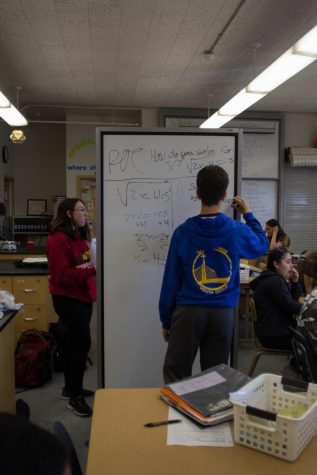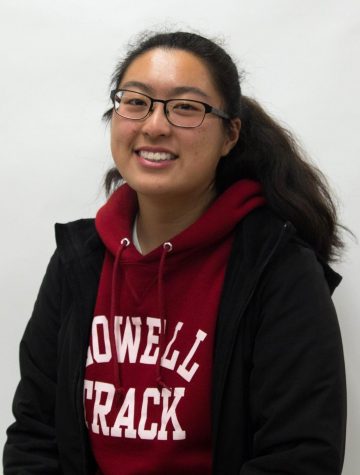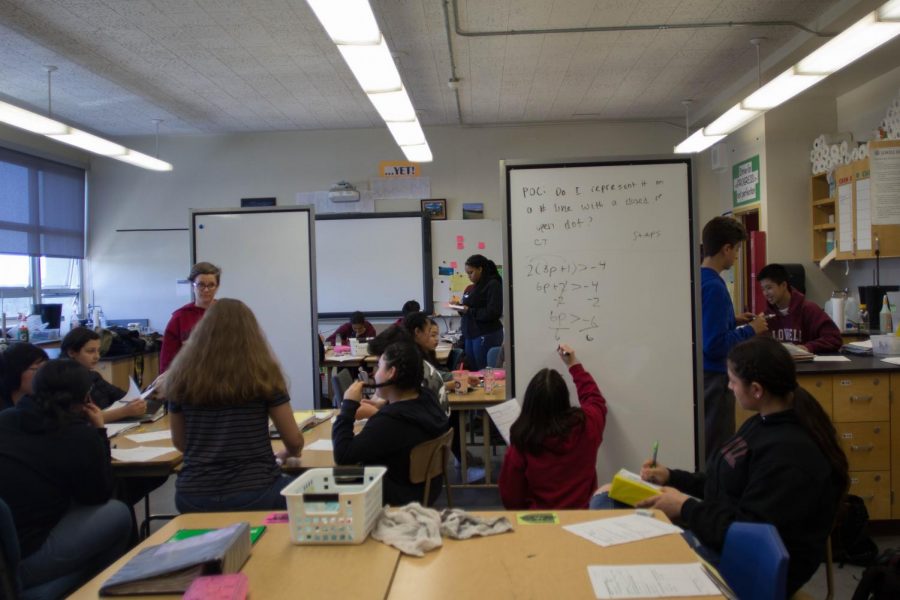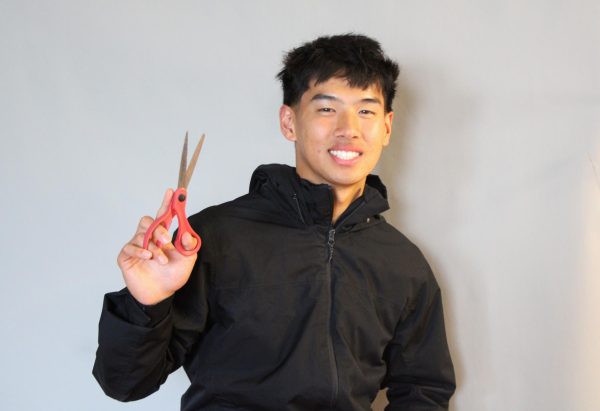Accommodating for academic success: New AVID course is offered for freshmen
AVID helps students utilize various studying methods and thinking skills for their regular education courses and prepares them for college applications.
Lowell’s academic rigor challenges students to exceed personal expectations, and often statewide expectations. A typical school day can consist of consecutive back-to-back tests, crammed-in lab reports, oral presentations, essays and the dreaded homework. Students are known to study for hours on end. In order to minimize this weight of stress on students, the college preparatory program Advancement Via Individual Determination (AVID) encourages students to tackle their courses efficiently. For students who fall under certain academic and familial qualifications, AVID is a year-long course aimed to guide them through the studying process, peer review, discussion and preparation for demanding course loads Lowell is known to offer.
Created in 1980, AVID has been provided to high schools across the nation and within SFUSD. It was designed as a college prep program for students in the academic middle with a GPA of 2.0-3.5. At Lowell, the AVID program is an elective currently available for freshmen; however, in fall 2019, AVID will be open to both sophomores and freshmen.
The learning goals within AVID are focused around fine-tuning the learning process, creating better study habits and utilizing effective note-taking. Certain essential study habits like proper note-taking, organization and consistent studying can often be overlooked by students. Honors chemistry and AVID teacher Michelle Trimble says the program encourages students to “study more effectively—study smarter, not longer.” By applying this mindset directly to their curriculum, the program assures that students have the foundation and building blocks to be successful enough for college level courses, according to counselor Cheryl Fong. “It’s a good opportunity to teach students more than just the book smarts. It also is a program that’s geared towards supporting underrepresented students,” Fong said.

In AVID, students discuss and solve problems together, allowing them to understand necessary concepts.
Freshman Reesalyn Tayag was able to join AVID through recommendations from the school and support from her parents. According to Tayag, AVID has largely improved her outlook on studying. “Before I joined AVID, I was procrastinating but now I take notes and I review everyday,” she said. Tayag stresses that it becomes a habit to continuously cram loads of homework into one night. “A lot of students procrastinate here, and I can see that with my own eyes,” she said.
AVID can be overlooked as a class for doing homework, but Trimble sees it very differently. “I want to reiterate that AVID isn’t a study hall, but it’s learning how to learn, and learning about the college process,” Trimble said. In AVID, students discuss questions they find difficult in their regular classes, and work with each other step-by-step to answer them. Being all freshmen and sharing similar classes, students can help each other out in understanding certain concepts. Trimble says they do weekly peer review exercises where the class is divided into groups and write questions up on the board to solve. Peers then work together to figure the answers out.
I want to reiterate that AVID isn’t a study hall, but it’s learning how to learn, and learning about the college process
— Michelle Trimble
Along with collective group work, Trimble stresses a few simple, yet effective organization methods students can practice individually, like using a planner, taking Cornell notes, and utilizing daily ten-minute review sessions. “It becomes that much easier to study when you realize how important organization is for managing stress levels, get to find better ways to organize notes, and institute habits about going back to the notes very frequently,” she said.
In addition to aiding students in studying, AVID helps them to be prepared for college, giving freshmen a head start. For example, students do individual research on a certain college of their choice, focusing on its requirements. Then students present the factors of admission and discuss financial, social and academic criteria. Exercises like these get ninth-grade students into the early habit of college decision making and grasping “a wider understanding of the colleges that are out there,” Trimble said.
According to Trimble, AVID is beneficial to underrepresented student populations. A variety of factors like family backgrounds, ethnic groups and financial situations can affect a student’s academic competence, often limiting resources to combat AP classes and other demanding courses. A significant portion of the student body come from families who are unable to completely provide them the right academic support, according to Trimble. She added that potential first-generation college students are from underrepresented categories. “The mission statement behind AVID is to support those students,” Trimble said.

Tayag believes that AVID also provided her with an easier transition into the strenuous high school life. Coming from a smaller school, the shift into Lowell felt slightly overwhelming for her. Adjusting to a heightened pace of studying wasn’t the only concern on Tayag’s mind. She felt just as disconnected on a social level. “It was really hard making friends once I first got into AVID,” she said. “In the beginning of the school year I didn’t know anybody in AVID, but now we all know each other, and it’s really fun.”
Through collaboration with other AVID students, Tayag realized that there were students struggling to adapt to the Lowell academic culture and felt a sense of empathy and connection with other AVID students. Seeing how competitive the school is, students who feel like they aren’t meeting the expected standards can feel detached from peers or avoid taking certain courses, according to Trimble. “You could imagine that saying you don’t understand something is difficult for a Lowell student to say,” she said. AVID places an emphasis on an interactive process between peers in this way. “It’s important that they form relationships with the people in their class as well,” Trimble said.
Despite its prominence nationally and locally, AVID was first administered at Lowell last semester. Other SFUSD high schools like Washington, Mission, Galileo, Marshall, John O’Connell and Lincoln have had the program available for all of their students, ranging from freshmen to seniors, for a little over a decade now, according to an SFUSD report. Trimble mentioned noticing that the AVID program had positively affected students in a previous high school she had worked in San Leandro. “I was just on the cusp of getting involved in the AVID program there,” Trimble said. “When I met my Lowell students, they were struggling so much. I considered bringing the program here, [though] it took a while to catch on.” The final decision to administer the program was ultimately up to Principal Andrew Ishibashi. After discussing it with a few colleagues, Trimble agreed with them that the program would be beneficial for Lowell and pitched the suggestion to Ishibashi.
You could imagine that saying you don’t understand something is difficult for a Lowell student to say — Michelle Trimble
Tayag highly recommends the program to students who feel the need for a certain academic boost, a college preparatory course or simply a smoother transition into the hectic high school life. “I would recommend AVID especially if you’re considering about your future, because sooner or later, you’ll have the SATs, college applications, and all that,” Tayag said. “AVID is going to prepare you for that. We’re already thinking about that freshman year, and it might seem early but it’s a great way to be prepared for it.” Tayag plans to continue AVID throughout the next three years, as Lowell is planning on expanding the program to sophomores, juniors and seniors in the coming years.
AVID is open to all students, though there is an application process. “There are interviews, qualifications from families—not just their status as far as education, but maybe even their finances,” Fong said. AVID wants to make sure that the students will adapt well and fit in with the culture that the program is trying to develop within the class, according to Trimble. Interested students should reach out for more information. “They can definitely come talk to me, Ms. Trimble, Mr. Beltran or even just any of the counselors here,” Fong said.

Find me taking photos, pole vaulting, and avoiding sand :)











